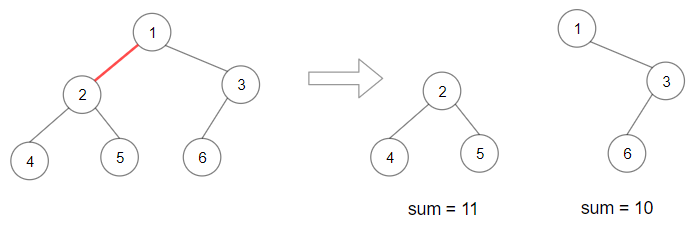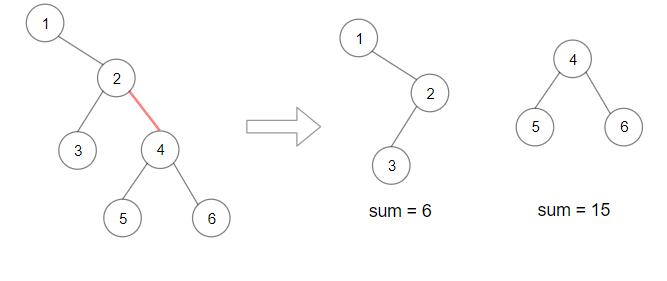| comments | difficulty | edit_url | rating | source | tags | |||
|---|---|---|---|---|---|---|---|---|
true |
Medium |
1674 |
Weekly Contest 174 Q3 |
|
Given the root of a binary tree, split the binary tree into two subtrees by removing one edge such that the product of the sums of the subtrees is maximized.
Return the maximum product of the sums of the two subtrees. Since the answer may be too large, return it modulo 109 + 7.
Note that you need to maximize the answer before taking the mod and not after taking it.
Example 1:
Input: root = [1,2,3,4,5,6] Output: 110 Explanation: Remove the red edge and get 2 binary trees with sum 11 and 10. Their product is 110 (11*10)
Example 2:
Input: root = [1,null,2,3,4,null,null,5,6] Output: 90 Explanation: Remove the red edge and get 2 binary trees with sum 15 and 6.Their product is 90 (15*6)
Constraints:
- The number of nodes in the tree is in the range
[2, 5 * 104]. 1 <= Node.val <= 104
# Definition for a binary tree node.
# class TreeNode:
# def __init__(self, val=0, left=None, right=None):
# self.val = val
# self.left = left
# self.right = right
class Solution:
def maxProduct(self, root: Optional[TreeNode]) -> int:
def sum(root: Optional[TreeNode]) -> int:
if root is None:
return 0
return root.val + sum(root.left) + sum(root.right)
def dfs(root: Optional[TreeNode]) -> int:
if root is None:
return 0
t = root.val + dfs(root.left) + dfs(root.right)
nonlocal ans, s
if t < s:
ans = max(ans, t * (s - t))
return t
mod = 10**9 + 7
s = sum(root)
ans = 0
dfs(root)
return ans % mod/**
* Definition for a binary tree node.
* public class TreeNode {
* int val;
* TreeNode left;
* TreeNode right;
* TreeNode() {}
* TreeNode(int val) { this.val = val; }
* TreeNode(int val, TreeNode left, TreeNode right) {
* this.val = val;
* this.left = left;
* this.right = right;
* }
* }
*/
class Solution {
private long ans;
private long s;
public int maxProduct(TreeNode root) {
final int mod = (int) 1e9 + 7;
s = sum(root);
dfs(root);
return (int) (ans % mod);
}
private long dfs(TreeNode root) {
if (root == null) {
return 0;
}
long t = root.val + dfs(root.left) + dfs(root.right);
if (t < s) {
ans = Math.max(ans, t * (s - t));
}
return t;
}
private long sum(TreeNode root) {
if (root == null) {
return 0;
}
return root.val + sum(root.left) + sum(root.right);
}
}/**
* Definition for a binary tree node.
* struct TreeNode {
* int val;
* TreeNode *left;
* TreeNode *right;
* TreeNode() : val(0), left(nullptr), right(nullptr) {}
* TreeNode(int x) : val(x), left(nullptr), right(nullptr) {}
* TreeNode(int x, TreeNode *left, TreeNode *right) : val(x), left(left), right(right) {}
* };
*/
class Solution {
public:
int maxProduct(TreeNode* root) {
using ll = long long;
ll ans = 0;
const int mod = 1e9 + 7;
function<ll(TreeNode*)> sum = [&](TreeNode* root) -> ll {
if (!root) {
return 0;
}
return root->val + sum(root->left) + sum(root->right);
};
ll s = sum(root);
function<ll(TreeNode*)> dfs = [&](TreeNode* root) -> ll {
if (!root) {
return 0;
}
ll t = root->val + dfs(root->left) + dfs(root->right);
if (t < s) {
ans = max(ans, t * (s - t));
}
return t;
};
dfs(root);
return ans % mod;
}
};/**
* Definition for a binary tree node.
* type TreeNode struct {
* Val int
* Left *TreeNode
* Right *TreeNode
* }
*/
func maxProduct(root *TreeNode) (ans int) {
const mod = 1e9 + 7
var sum func(*TreeNode) int
sum = func(root *TreeNode) int {
if root == nil {
return 0
}
return root.Val + sum(root.Left) + sum(root.Right)
}
s := sum(root)
var dfs func(*TreeNode) int
dfs = func(root *TreeNode) int {
if root == nil {
return 0
}
t := root.Val + dfs(root.Left) + dfs(root.Right)
if t < s {
ans = max(ans, t*(s-t))
}
return t
}
dfs(root)
ans %= mod
return
}/**
* Definition for a binary tree node.
* class TreeNode {
* val: number
* left: TreeNode | null
* right: TreeNode | null
* constructor(val?: number, left?: TreeNode | null, right?: TreeNode | null) {
* this.val = (val===undefined ? 0 : val)
* this.left = (left===undefined ? null : left)
* this.right = (right===undefined ? null : right)
* }
* }
*/
function maxProduct(root: TreeNode | null): number {
const sum = (root: TreeNode | null): number => {
if (!root) {
return 0;
}
return root.val + sum(root.left) + sum(root.right);
};
const s = sum(root);
let ans = 0;
const mod = 1e9 + 7;
const dfs = (root: TreeNode | null): number => {
if (!root) {
return 0;
}
const t = root.val + dfs(root.left) + dfs(root.right);
if (t < s) {
ans = Math.max(ans, t * (s - t));
}
return t;
};
dfs(root);
return ans % mod;
}
